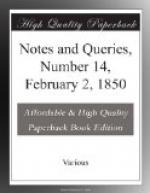Among a few of the many floating quotable passages universally known, without any trace of the authors, among general readers and writers, are the following:—
“When wild in woods the noble savage ran.”
DRYDEN’s Conquest of Grenada.
“And whistled as he went for want of thought.”
DRYDEN’s Cymon and Iphigenia.
“Great wits are sure to madness
near allied,
And thin partitions do their bounds divide.”
DRYDEN’s Absalom and Achitophel, st. i. I. 163.
“The tenth transmitter of a foolish face.”
SAVAGE.
“When Greek meets Greek then comes the tug of war.”
NAT. LEE.
The real line in Lee is—
“When Greeks join Greeks then was the tug of war.”
LEE’s Alexander the Great.
J.W.G. GUTCH
* * * * *
I wish to ask a few questions, referring to these lines, if you do not think the subject already exhausted by Mr. Rimbault’s curious and interesting communication.
1. Does not the entire quotation run somewhat thus:—
“For he that fights and runs away
May live to fight another day;
But he that is in battle slain
Can never hope to fight again”?
2. Are the two last lines in the Musarum Deliciae?
3. May not the idea suggesting the two first lines be traced to some passage in one of the orations of Demosthenes, and, PAST him, to the “[Greek: Anaer ho pheugon kai palin machaesetai]” of some contemporary, if not still older writer?
4. Whose Apothegems [qy., those of Demosthenes?] are under consideration on folio 239., from which Mr. Rimbault quotes?
Queries 1, 2, 3 have long stood in MS. in my note-book, and I should much like to see them in print, while the subject to which they refer is still fresh in the minds of your readers.
MELANION
* * * * *
The lines—
“For he that fights and runs away
May live to fight another day,”
resemble the following quatrain in the Satyre Menippee, being one of the several verses appended to the tapestry on which was wrought the battle of Senlis:—
“Souvent celuy qui demeure
Est cause de son meschef;
Celuy qui fuit de bonne heure
Peut combattre de rechef.”
A.J.H.
* * * * *
NOTES FROM FLY-LEAVES, No. 5.
In the library of St. John’s College are some hundreds of volumes bequeathed to it by Thomas Baker; most of these have little notices on the fly-leaves, some thirty or forty of which seem worth printing. One (Strype’s Life of Parker) has marginal notes throughout the book, the value of which will be duly appreciated by those who have read Baker’s notes on Burnet’s Reformation. (See the British Magazine for the last year.)




